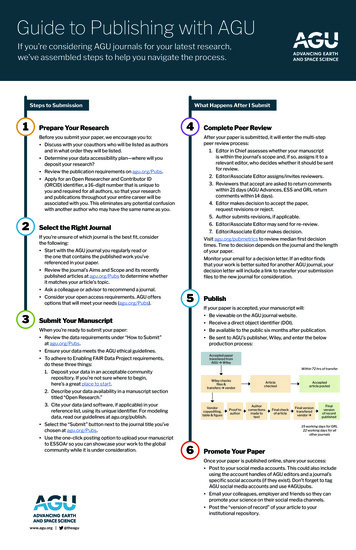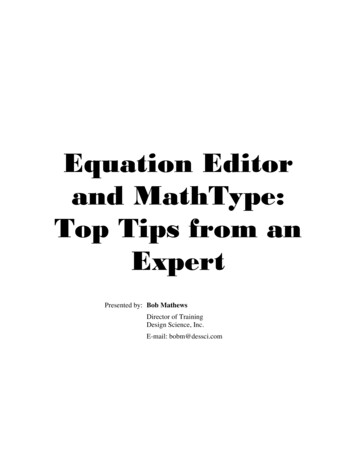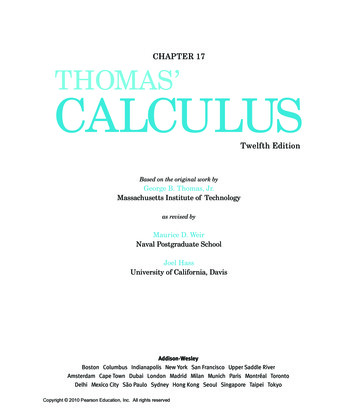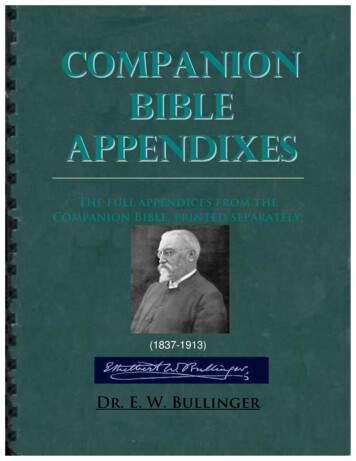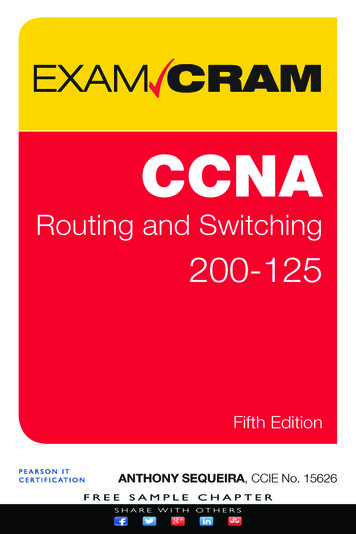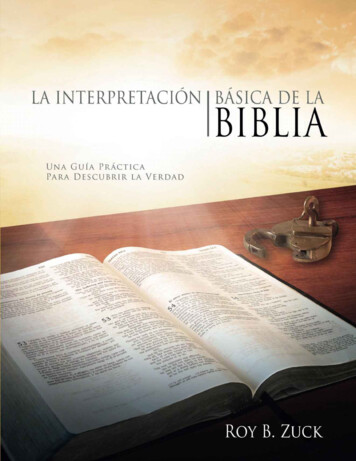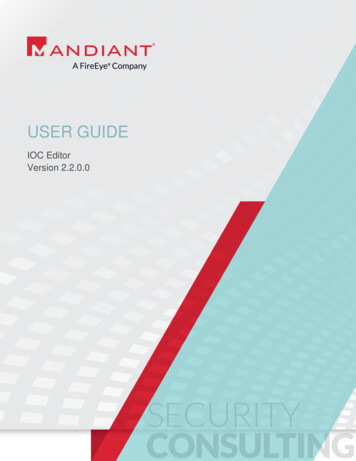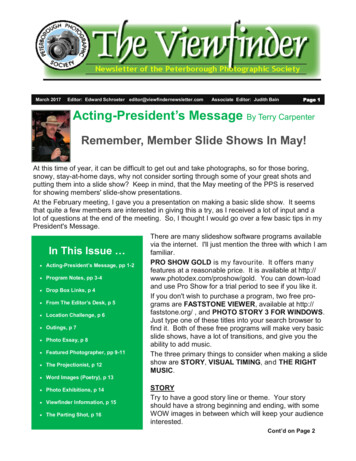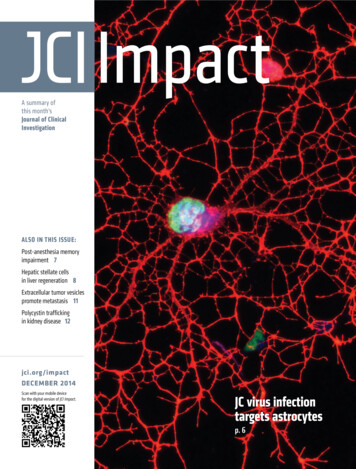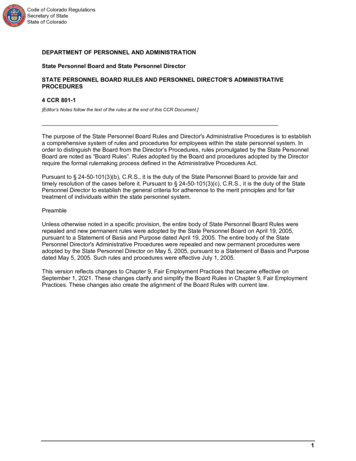
Transcription
loradoDEPARTMENT OF PERSONNEL AND ADMINISTRATIONState Personnel Board and State Personnel DirectorSTATE PERSONNEL BOARD RULES AND PERSONNEL DIRECTOR’S ADMINISTRATIVEPROCEDURES4 CCR 801-1[Editor’s Notes follow the text of the rules at the end of this CCR Document.]The purpose of the State Personnel Board Rules and Director's Administrative Procedures is to establisha comprehensive system of rules and procedures for employees within the state personnel system. Inorder to distinguish the Board from the Director’s Procedures, rules promulgated by the State PersonnelBoard are noted as “Board Rules”. Rules adopted by the Board and procedures adopted by the Directorrequire the formal rulemaking process defined in the Administrative Procedures Act.Pursuant to § 24-50-101(3)(b), C.R.S., it is the duty of the State Personnel Board to provide fair andtimely resolution of the cases before it. Pursuant to § 24-50-101(3)(c), C.R.S., it is the duty of the StatePersonnel Director to establish the general criteria for adherence to the merit principles and for fairtreatment of individuals within the state personnel system.PreambleUnless otherwise noted in a specific provision, the entire body of State Personnel Board Rules wererepealed and new permanent rules were adopted by the State Personnel Board on April 19, 2005,pursuant to a Statement of Basis and Purpose dated April 19, 2005. The entire body of the StatePersonnel Director's Administrative Procedures were repealed and new permanent procedures wereadopted by the State Personnel Director on May 5, 2005, pursuant to a Statement of Basis and Purposedated May 5, 2005. Such rules and procedures were effective July 1, 2005.This version reflects changes to Chapter 9, Fair Employment Practices that became effective onSeptember 1, 2021. These changes clarify and simplify the Board Rules in Chapter 9, Fair EmploymentPractices. These changes also create the alignment of the Board Rules with current law.1
CODE OF COLORADO REGULATIONSState Personnel Board and State Personnel DirectorChapter 14 CCR 801-1Organization, Responsibilities, Ethics, Payroll Deduction, and DefinitionsAuthority for rules promulgated in Chapter 1, Organization, Responsibilities, Ethics, Payroll Deduction,and Definitions, is found in State of Colorado Constitution Article XII, Sections 13, 14 and 15, State ofColorado Revised Statutes (C.R.S.) §§24-50-103, 24-50-104(8), 24-50-112.5, 24-50-116, 24-50-117, 2450-124, 24-50-128, 24-50-129, 24-50-130, 24-50-132, 24-50-145, 24-2-103, 24-6-402, 24-31-301-104,24-30-2103, 24-30-2105, 24-50.3-105, 24-50.3-105, 24-50.5-103, 24-72-201, -204.5, 25-75-112, and 2418-101 through 205, Title 24 Article 18, Part 1, Code of Ethics, Title 24, Article 50: 24-50-101, 24-50-102,24-50-103, 24-50-104, 24-50-109.5, 24-50-112.5, 24-50-114, 24-50-116, 24-50-123, 24-50- 124, 24-50125, 24-50-125.3, 24-50-125.4, 24-50-126, 24-50-128, 24-50-129, 24-50-130, 24-50-134, 24-50-135, 2450-137, 24-50-141, 24-50-203, 24-50-503, 24-50-507. Board rules are identified by cites beginning with“Board Rule.” (01/01/2021)General PrincipleBoard Rule 1-1. The purpose of the rules promulgated herein by the Colorado State Personnel Board(hereafter “Board”) and the Colorado State Personnel Director’s (hereafter “Director”)administrative procedures is to provide a sound, comprehensive system of human resourcesmanagement for the employees within the state personnel system. This system recognizesemployee rights, values the differing roles and relevant contributions of various stakeholders,allows reasonable discretion for departments to establish their own operating practices, andensures the Board rules and Director’s administrative procedures (hereinafter “rules”)complement each other. It is the intent of the Board and the Director to adopt the minimum rulesnecessary to ensure the least cumbersome process possible for administering the statepersonnel system while meeting legal requirements.State Personnel BoardBoard Rule 1-2. Certified employees shall be eligible to elect members of the Board in accordance with§24-50-103, C.R.S.A.The Board’s director shall conduct an election to fill the vacant position of an electedBoard member within three (3) months of the date of vacancy.B.A certified employee may contest the election of an elected Board member in the mannerdescribed at §24-50-103(3)(c)(II), C.R.S., only after:1.Giving notice to the Board of the grounds for contest within seven (7) businessdays after the election has been certified; and2.Giving the Board, through its director, at least twenty-one (21) days to cure theallegedly invalid election. (1/01/15)Board Rule 1-3. The Board’s director, or other person with written delegation, is the agent for service ofprocess for any action involving the Board.Board Rule 1-4. The Board shall meet as often as necessary to conduct its business, or at such othertimes as may be determined by the Board chairperson or a majority of the Board. Reasonablenotice of any regular or special meeting shall be given to the Board members, interested parties,and the public as provided in §24-6-402, C.R.S., or successor statute.2
CODE OF COLORADO REGULATIONSState Personnel Board and State Personnel Director4 CCR 801-1Board Rule 1-5. Unless otherwise ordered, all materials to be considered by the Board at its monthlymeeting shall be received in the Board’s office at least twelve (12) calendar days before themeeting. The party shall provide the original and nine (9) copies of all materials to be consideredby the Board, except as otherwise provided in these rules. (1/1/07).State Personnel Director1-6.The Director, under a current written delegation, may delegate certain Director’s powers to headsof principal departments and presidents of institutions of higher education (hereafter“department”). Such delegated power is discretionary and subject to the Director’s review. Lawand the Director specify powers that shall not be delegated outside the Department of Personnel.1-7.The Director may delegate any and all powers, duties, and functions to the Division of HumanResources in the Department of Personnel.Appointing Authority1-8.Executive directors of principal departments and presidents of institutions of higher education(hereafter “department” and “department head”) are appointing authorities for their own officesand division directors. Division directors as defined by law are appointing authorities for theirrespective divisions. An appointing authority may delegate in writing any and all human resourcefunctions, including the approval of further delegation beyond the initial designee. In the area ofcorrective, disciplinary, or other actions that have an adverse effect on base pay, status, ortenure, each department shall establish a written document specifying the appointing authority foreach individual employee and this information shall be made available to the employee.1-9.Appointing authority powers include, but are not limited to: hiring and evaluating performance;determining the amount and type of any non-base incentive within policies issued by the Directorand the department’s written plan; defining a job; administering corrective/disciplinary action;determining work hours including meal periods and breaks, and safe conditions and tools ofemployment; identifying positions to be created or abolished; assigning employees to positions;determining work location; and accountability for any other responsibilities in rule. (7/1/07)1-10.Appointing authorities have a duty to ensure employees are oriented to the workplace, includingcommunicating requirements and rights. (04/01/2020)1-11.All appointing authorities, managers, and supervisors are accountable for compliance with theserules and all applicable laws, including implementation of policy directives and executive orders.(04/01/2020)Employee ActivitiesBoard Rule 1-12.Employees are required to know and adhere to personnel rules, laws, andexecutive orders governing their employment. Departments are required to make those rules,laws, and executive orders available to employees.3
CODE OF COLORADO REGULATIONSState Personnel Board and State Personnel Director4 CCR 801-1Board Rule 1-13.No employee is allowed to engage in any outside employment or other activitythat is directly incompatible with the duties and responsibilities of the employee’s state position,including any business transaction, private business relationship, or ownership. The employee isnot allowed to accept outside compensation for performance of state duties. This includesacceptance of any fee, compensation, gift, reward, gratuity, expenses, or other thing of monetaryvalue that could result in preferential treatment, impediment of governmental efficiency oreconomy, loss of complete independence and impartiality, decision making outside officialchannels, and disclosure or use of confidential information acquired through state employment.Incompatibility includes reasonable inference that the above has occurred, may occur, or has anyother adverse effect on the public’s confidence in the integrity of state government.A.If the employee receives any such form of compensation that cannot be returned, it is tobe immediately turned over to the appropriate state official as state property except forthe following. The employee may accept awards from non-profit organizations formeritorious public contributions. Honoraria or expenses for papers, demonstrations, andappearances made with approval of the appointing authority may also be kept if theactivity occurs during a holiday, leave, a scheduled day off, or outside normal work hours.B.An employee shall give advance notice to the appointing authority and take necessarysteps to avoid any direct conflict between the employee’s state position and outsideemployment or other activity.Board Rule 1-14.Employees may engage in outside employment with advance written approvalfrom the appointing authority. The appointing authority shall base approval on whether theoutside employment interferes with the performance of the state job or is inconsistent with theinterests of the state, including raising criticism or appearance of a conflict.1-15.A.An employee may be retained by a different department through a personal servicescontract to perform a different function consistent with the requirements of Chapter 10,Personal Services Agreements.B.A personal services contract involving an employee shall not be used to evade overtime.Employment with more than one (1) department is commonly referred to as dual employment. Anemployee may be employed by and receive compensation from more than one (1) departmentwith advance written approval of both appointing authorities. There shall be a written agreementbetween the appointing authorities that specifies the terms and conditions of the arrangementincluding any overtime considerations. For further information, refer to Chapter 3, Compensation.(04/01/2020)Board Rule 1-16.It is the duty of state employees to protect and conserve state property. Noemployee shall use state time, property, equipment, or supplies for private use or any otherpurpose not in the interests of the State of Colorado.Board Rule 1-17.Employees may participate in political activities subject to state and federal laws.No state time or property may be used for this purpose.Board Rule 1-18.Employees have the right to associate, self-organize, and designaterepresentatives of their choice. Membership in any employee organization or union is not acondition of state employment. No employee may be coerced into joining or not joining andsolicitation of members shall not occur during work hours without the approval of the appointingauthority. The employee’s representative may confer, with prior consent from the supervisor, onemployment matters during work hours. Such conferences should be scheduled to minimizedisruption to productivity and the general work environment. A supervisor’s consent shall not beunreasonably withheld.4
CODE OF COLORADO REGULATIONSState Personnel Board and State Personnel Director4 CCR 801-1Board Rule 1-19.An employee may voluntarily and knowingly waive, in writing, all rights under thestate personnel system, except where prohibited by state or federal law.RecordsBoard Rule 1-20.The Board and the Director shall maintain records of personnel activities thathave legal, administrative, or historical value in accordance with statute. Legal value is defined asa Board appeal record less than twenty (20) years old or the statement of basis and purpose for arule that is in effect or was in effect during the past five (5) years. Administrative value is definedas a record that is less than five (5) years old and summarizes department cost efficiencies,including staffing and workload statistics. Historical value is defined as a record documenting amajor change in the function of the Board or the Department of Personnel.1-21.Departments shall maintain official records in written or electronic form. Access to records isgoverned by §24-72-201, C.R.S, et seq. Each department shall have an authorized recordscustodian who is accountable for the maintenance, access and confidentiality, and disposition ofall records required by state and federal law. The Division of Human Resources shall haveaccess to records required for the monitoring of delegated authorities and other official duties.1-22.When an employee transfers or reinstates to a different department, all official employee recordsshall be forwarded to the new department within ten (10) business days. Failure to forward theserecords may result in liability for violation of these rules and any applicable laws. (04/01/2020)1-23.Official Personnel File. Each employee’s official personnel file shall include the following and beretained ten (10) years after separation: a separate record of all employment actions; mostcurrent application information; corrective/disciplinary action information unless rescinded by theBoard or further appeal or removed by the appointing authority; final annual performanceevaluations for at least the past three (3) years; grievance and other dispute information; letters ofrecommendation, reference, or commendation as requested; and, any other information desiredby the appointing authority. An employee shall be given a copy of any information placed in thepersonnel file, except for reference checks. (7/1/07)1-24.Medical Records. Any medical information on the employee or a family member shall bemaintained in a separate, confidential medical file with limited access in accordance with law.1-25.Selection Records. Selection records shall be kept for two (2) years after expiration of the eligiblelist, except when notified of a charge of discrimination. In such a case, the record is maintaineduntil the charge is resolved. The content of selection records shall include all related informationup to the establishment of the eligible list. (3/30/13)Human Resource Innovation ProgramsBoard Rule 1-26.A written statement of each Human Resource Innovation Program (HRIP)implemented by the agency shall be submitted by the head of the agency to the State PersonnelBoard or State Personnel Director, as appropriate, at 1525 Sherman Street, Denver, CO, 80203,commensurate with the implementation of each HRIP. The description shall indicate the following:A.In developing the HRIP, input was obtained from both management and nonmanagement employees in the department; and,B.The HRIP complies with the Colorado Constitution, statutes, and rules.5
CODE OF COLORADO REGULATIONSState Personnel Board and State Personnel Director4 CCR 801-1The Board shall forward HRIPs within the Director’s jurisdiction to the Director. After review, theDirector will issue a written consultation. The Board will review each HRIP within the Board’sjurisdiction at the next regularly scheduled public Board meeting and issue a written consultation.Each department head is responsible for updating the statement and submitting any modificationsor revisions of the HRIP to the Board or Director commensurate with such changes. (1/01/15)Definitions1-27.Advisor. Individual who assists a party during a grievance or the performance managementdispute resolution process by explaining the process, helping identify the issues, preparingdocuments, and attending meetings. (7/1/07)1-28.Allocation. Assignment of an individual position to the proper class.1-29.Announcement. The published notice for a position or class that will be filled on the basis of meritand fitness.1-30.Applicant. An individual who applies for employment in the state personnel system.1-31.Applicant Pool. A group of individuals who have applied for employment in the state personnelsystem.1-32.Base Pay. An employee’s salary without premium pay. Synonymous with base salary.Board Rule 1-32.1.Certified. The status of an employee who has successfully completed aprobationary period or a trial service period. (3/15/11)1-33.Class. A group of positions whose essential character (general nature of the work andresponsibilities) warrants the same pay grade, title, and similar qualifications for entry into theclass.1-34.Class Conversion. Automatic movement of a current title and grade to a new title and grade.1-35.Class Description. The official written description of a class series and its levels as issued by theDepartment of Personnel.1-36.Class Placement. Portion of a system maintenance study in which all affected positions areindividually placed in the proper new class.1-37.Class Series. A group of classes engaged in the same kind of occupational work but representingdifferent levels.1-37.1 Comparative Analysis. A process that utilizes professionally accepted standards that comparesspecific job-related knowledge, skills, abilities, behaviors and other competencies. Such aprocess may be numeric or non-numeric. (3/30/13)1-38.Competencies. Observable, measurable patterns of knowledge, skills and abilities, behaviors,and other characteristics that employees need to successfully perform work-related tasks.1-38.1. Conditional Appointments. A temporary appointment to a permanent position approved by theAppointing Authority. The appointment applies to a current certified employee who is qualifiedand temporarily promotes into a permanent vacancy for which no eligible list exists. (04/01/2020)6
CODE OF COLORADO REGULATIONSState Personnel Board and State Personnel Director4 CCR 801-11-38.2. Conditions of Employment. Conditions of employment refer to requirements of a position such aspassing a criminal background check, meeting travel demands, regularly lifting a specifiedamount of weight, driving requirements and driver’s license requirements. Conditions ofemployment may be based on job analysis and may be documented in the position description.Note: Conditions of employment apply to a position, whereas minimum qualifications apply to ajob class. This definition is not applicable to the Colorado Partnership for Quality Jobs andServices Act, 24-50-Part 11. (01/01/2021)1-38.3. Critical Positions. Positions departments determine as critical to their operations. Employees incritical positions can be FLSA exempt or nonexempt and can be expected to work and/or remainat their worksite in delayed start, early release, or closure situations. (04/01/2020)Board Rule 1-39.Day. Calendar day unless otherwise specified.Board Rule 1-40.Department. One of the principal departments defined in law and institutions ofhigher education.Board Rule 1-40.1.Departmental Reemployment List. A list which is established on a departmentalbasis, as listed in Chapter 7, Separation, containing the names of certified employees who meetone (1) of the following conditions: (a) separated from employment due to layoff; (b) voluntarilydemoted in lieu of layoff or as a result of a position’s reallocation; and/or (c) former position nolonger exists upon return from an exempt position accepted at the request of the governor orother elected or appointed official and the employee is laid off. (3/15/11))Board Rule 1-41.Disciplinary Suspension. A type of disciplinary action in which an employee is notallowed to work and is not paid for a specified period of time.Board Rule 1-42.1-43.Dismissal. Disciplinary termination of employment.Eligible List. A list of persons who have successfully passed through a comparative analysis andmay be considered for appointment. Referrals are drawn from this list. (1/1/14)Board Rule 1-44.Employee. An individual who occupies a full-time or part-time position in the statepersonnel system.Board Rule 1-45.Employment Lists. Statutory term that includes promotional and open-competitiveeligible lists and reemployment lists.1-45.1. Essential Positions. Positions that perform essential law enforcement, highway maintenance, andother support services directly necessary for the health, safety, and welfare of patients, residents,and inmates of state institutions or state facilities. Employees in essential positions can be onlyFLSA nonexempt and can be required to work unexpected or unusual work hours to perform theessential and/or emergency services of the department without delay and/or without interruption.(04/01/2020)1-46.Examination. A numerical assessment of job-related competencies, knowledge, skills, abilitiesand job fit to screen applicants for the eligible list. (3/30/13)Board Rule 1-47.Exempt Employee. One who is not eligible for overtime.7
CODE OF COLORADO REGULATIONSState Personnel Board and State Personnel Director4 CCR 801-11-47.1. Fair Labor Standards Act (FLSA). The Fair Labor Standards Act (FLSA) includes but is not limitedto, the establishment of minimum wage, overtime pay, recordkeeping, and child labor standardsaffecting full-time and part-time workers in the private sector and in Federal, State, and localgovernments. Special rules apply to State and local government employment including but notlimited to: (a) compensatory time off instead of cash overtime pay, (b) fire protection and lawenforcement activities and (c) volunteer services. (04/01/2020)1-48.Full-Time. A position scheduled and budgeted for 2080 hours per fiscal year. (04/01/2020)Board Rule 1-49.Good Cause. Any cause not attributable to a party’s or counsel’s act or omission,including but not limited to: death or incapacitation of a party or the attorney for the party; a courtorder staying or otherwise necessitating a continuance; a change in the parties or pleadingssufficiently significant to require a postponement; a showing that more time is clearly necessary tocomplete authorized discovery or other mandatory preparation for hearing; or agreement of theparties to a settlement which has been or will likely be approved by the final decision maker.A.Good cause will normally not include: unavailability of counsel due to an engagement inanother judicial or administrative proceeding, unless such other proceeding wasinvoluntarily set subsequent to the present case; unavailability of a necessary witness ifthe witness’ testimony can be taken by telephone or deposition; or failure of an attorneyto timely prepare for the hearing.1-50.Health Care Provider. For purposes of family/medical leave only, a doctor of medicine orosteopathy, dentist, podiatrist, clinical psychologist, optometrist, chiropractor limited to manualmanipulation of the spine to correct a subluxation as demonstrated by x-ray, nurse practitioner,physician’s assistant, nurse mid-wife, Christian Science practitioner listed with First Church ofChrist, Scientist in Boston, and clinical social worker. Health care providers shall be authorized topractice and be performing within the scope of their practice.1-51.Independent Contractor. A firm or individual who is responsible to the state for the results ofcertain work, but is not subject to the state’s control as to the means and methods ofaccomplishing those results. For purposes of determining independent contractor status, theDirector will apply the criteria set forth in the fiscal rules of the state controller, and state andfederal law. Independent contractor is synonymous with contractor for purposes of these rules.(5/1/10)1-52.Job Description. The official document summarizing the primary duties and responsibilitiesassigned to a position by the appointing authority.1-53.Job Evaluation System. System of classes and assigned pay grades developed by the Director.All positions are placed in the system during a system maintenance study or are allocated whenan assignment changes or a position is created.1-53.1. Job Qualifications. Includes the minimum qualifications for a vacancy’s class; any specialqualifications, including but not limited to any required education or experience and any licensureor certification requirements; and/or any pre- or post-employment screening requirements.(3/15/11)1-54.Laid Off. Involuntary non-disciplinary separation from a position in the state personnel systemand, if applicable, the offer of retention rights and/or placement on a reemployment list. (3/30/13)1-55.Layoff. Process of involuntarily separating an employee from a position in the state personnelsystem due to abolishment of the position for lack of work, lack of funds, reorganization, ordisplacement by another employee exercising retention rights. (3/30/13)8
CODE OF COLORADO REGULATIONSState Personnel Board and State Personnel Director4 CCR 801-11-55.01.Minimum Qualification. The type and level of education, experience, licensure,certification, and/or any applicable substitutions required for entry into a defined state personnelsystem job class. Minimum Qualifications are established by the Director. (04/01/2020)1-55.02.Nonexempt Employee. Employee in a position that is eligible for overtime under theFLSA. (04/01/2020)Board Rule 1-55.1.Non-disciplinary Demotion. An appointment which is a voluntary change to aclass with a lower pay range maximum. (3/15/11)Board Rule 1-56.Non-Permanent Position. A position established for a nine-month period or less.It may be a full-time or part-time work schedule. Synonymous with temporary. (3/30/13)1-56.1. Open Competitive List. A list containing the names of individuals who have successfullycompleted any applicable comparative analysis process resulting from a job announcement thatwas not restricted to current state employees. (3/30/13)1-56.2. Part-Time. A position scheduled for less than 2080 hours per fiscal year. (04/01/2020)1-57.Party or Parties. A person appealing and any person or department against whom an appeal isfiled.1-58.Pay Grade. Reflects the minimum and maximum base salary rates for work in a specific class.Individual salaries vary within the ranges depending on individual movements in accordance withthese provisions. Synonymous with pay level, range, or band.1-59.Pay Plans. Listing of all pay grades and their corresponding ranges for occupational groups.1-59.1. Pay Plan - Medical. The pay plan that applies to classified positions in specific class series withinthe Health Care Services Occupational Group. The statutory lid for the class series pay ranges isgreater than the general statutory lid. Employees occupying these positions are compensatedbased solely on performance as established in the required annual contract. (04/01/2020)1-60.Pay Rate. Actual base pay or salary amount.Board Rule 1-61.Permanent Position. A position that is carried on the staffing pattern in excess ofnine (9) months or on an annual, seasonal basis. It may be a full- or part-time work schedule.(3/30/13)Board Rule 1-62.Position. An individual job, as defined by an appointing authority, within the statepersonnel system.Board Rule 1-62.1.Probationary. A person who is not a current certified employee and who hasbeen selected from a referral list for a permanent position but has not yet been certified to theclass for that position. (3/15/11)1-62.2. Promotional List. A list containing the names of individuals who have successfully completed anyapplicable comparative analysis process resulting from a job announcement restricted to currentstate employees or former state employees separated from employment due to layoff. (3/30/13)9
CODE OF COLORADO REGULATIONSState Personnel Board and State Personnel Director4 CCR 801-11-62.2.1.Provisional Appointment. An immediate temporary appointment to a position with aperson from outside of the state personnel system for which no eligible list exists. Employees witha provisional appointment do not have the rights and benefits provided to classified employeeswithin the state personnel system except for those mandated by law and pay range minimums.Appointees shall possess the minimum qualifications for the position. Appointees shall not retainthe position as provisional longer than nine (9) months from the date of entrance of duty or one(1) month after the establishment of a referral list intended to permanently fill the position,whichever date is earlier. (04/01/2020)1-62.3. Qualified Applicant. An individual who submits a timely and sufficient application in response toan announcement and meets the job qualifications for the vacancy. (3/30/13)1-62.4. Qualified Applicant Pool. All individuals who are eligible to be included in any applicablecomparative analysis process because each of them satisfies the definition of qualified applicantfor the respective position or class. (3/30/13)1-62.5. Rank. Relative to position or degree of value. (1/1/14)1-63.Reemployment. The right of an employee to be returned or rehired to the class from whichseparated by layoff.Board Rule 1-64.Reemployment List. List of certified employees who were involuntarily terminatedor demoted due to layoff.1-64.1. Referral List. A list of the top six (6) individuals drawn from the eligible list who are to beconsidered by the appointing authority. In cases in which a non-numerical comparative analysishas been used, the appointing authority shall also consid
4 CCR 801-1 [Editor's Notes follow the text of the rules at the end of this CCR Document.] _ The purpose of the State Personnel Board Rules and Director's Administrative Procedures is to establish . 18-101 through 205, Title 24 Article 18, Part 1, Code of Ethics, Title 24, Article 50: 24-50-101, 24-50-102,


